
The emergence of the Internet of Things (IoT) has paved the way for an interconnected world, where devices and systems communicate with each other seamlessly. At the heart of this revolution are WiFi modules, which serve as the foundation for enabling wireless connections and data exchange. In this article, we delve deep into the role of WiFi modules in shaping the IoT landscape and explore the myriad possibilities they unlock for a connected future.
WiFi modules, often referred to as WiFi chips or modules, are the building blocks that allow devices to connect to the internet and communicate wirelessly. These compact electronic components integrate WiFi functionality into various devices, ranging from smartphones and laptops to smart home appliances and industrial machinery. By leveraging WiFi modules, these devices can seamlessly connect to each other and access the vast realm of the internet, unlocking a world of possibilities in terms of functionality, automation, and data exchange.
One of the key domains influenced by WiFi modules is the concept of smart homes and cities. WiFi-enabled devices, such as smart thermostats, security systems, and lighting systems, can communicate with each other and be controlled remotely via smartphones or voice assistants. This paradigm shift not only enhances convenience and comfort but also promotes energy efficiency and cost savings. Similarly, WiFi modules play a crucial role in transforming cities into smart cities, enabling efficient traffic management, environmental monitoring, and enhanced public services.
The integration of WiFi modules into industrial machinery and equipment has revolutionized industrial automation. These modules allow devices, sensors, and machines to transmit real-time data over WiFi networks, enabling seamless monitoring, control, and optimization of industrial processes. From intelligent inventory management to predictive maintenance, WiFi modules empower industries to enhance productivity, reduce downtime, and ensure efficient resource utilization.
WiFi modules have also made significant strides in the healthcare sector, particularly in the realm of wearable technology. By embedding WiFi modules in wearable devices, healthcare providers can remotely monitor patients' vital signs, track medication adherence, and enable timely intervention. Furthermore, WiFi-enabled medical devices facilitate real-time data transmission to healthcare professionals, enabling accurate diagnoses, personalized treatments, and telemedicine services.
Alongside the boon of connectivity, ensuring robust security in the IoT landscape is paramount. WiFi modules play a vital role in implementing strong security measures to protect data and devices from cyber threats. Encryption protocols, authentication mechanisms, and secure communication channels are integrated into WiFi modules to safeguard the integrity and confidentiality of data being transmitted. By leveraging robust security features, the IoT ecosystem can flourish with trust, encouraging widespread adoption and acceptance.
In conclusion, WiFi modules serve as the backbone for the IoT revolution, enabling seamless connectivity and data exchange across a broad range of devices and industries. From smart homes to industrial automation and healthcare, the impact of WiFi modules is profound and far-reaching. Embracing the potential of WiFi modules will undoubtedly shape a connected future, fostering innovation, efficiency, and convenience in our daily lives.
 Trolink Joint With Tuya to Make Iot Benefit Every Family
Trolink Joint With Tuya to Make Iot Benefit Every Family
 5 Key Indicators for WiFi Module Selection You Have to Know !
5 Key Indicators for WiFi Module Selection You Have to Know !
 IOT module is the brain of smart products
IOT module is the brain of smart products
 What is the signal coverage range of the WiFi module chip?
What is the signal coverage range of the WiFi module chip?